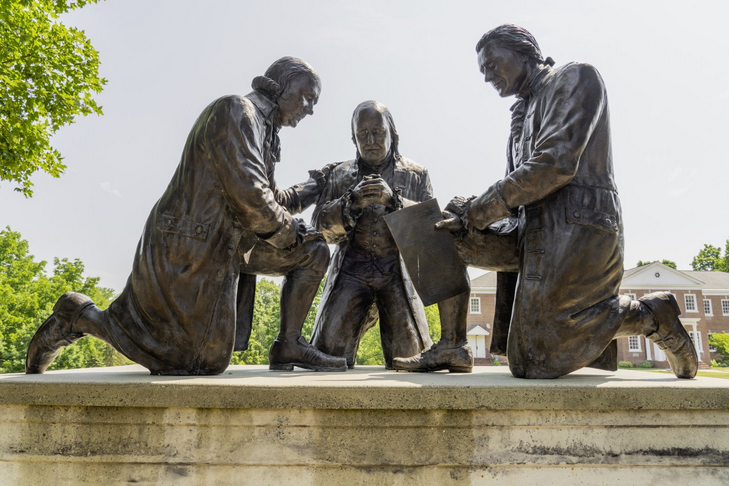from Right & Free,
6/3/22:
John Adams, who would soon surrender the presidency to Thomas Jefferson, ventured up to Capitol Hill on Nov. 22, 1800, to deliver the first-ever in-person presidential address in the not-yet-finished home of the United States Congress.
 It was noon on a Saturday. What message did he deliver?
First, Adams congratulated the American people for building the Capitol itself.
"I congratulate the people of the United States on the assembling of Congress at the permanent seat of their government, and I congratulate you, gentlemen, on the prospect of a residence not to be changed," he said. "Although there is cause to apprehend that accommodations are not now so complete as might be wished, yet there is great reason to believe that this inconvenience will cease with the present session."
Then Adams pointed to morality, religion and God.
"It would be unbecoming the representatives of this nation to assemble for the first time in this solemn temple without looking up to the Supreme Ruler of the universe and imploring His blessing," he said.
"May this territory be the residence of virtue and happiness!" said Adams. "In this city may that piety and virtue, that wisdom and magnanimity, that constancy and self-government, which adorned the great character whose name it bears be forever held in veneration! Here and throughout our country may simple manners, pure morals, and true religion flourish forever!"
This was not a new theme for the nation's second president or for his contemporaries.
It was noon on a Saturday. What message did he deliver?
First, Adams congratulated the American people for building the Capitol itself.
"I congratulate the people of the United States on the assembling of Congress at the permanent seat of their government, and I congratulate you, gentlemen, on the prospect of a residence not to be changed," he said. "Although there is cause to apprehend that accommodations are not now so complete as might be wished, yet there is great reason to believe that this inconvenience will cease with the present session."
Then Adams pointed to morality, religion and God.
"It would be unbecoming the representatives of this nation to assemble for the first time in this solemn temple without looking up to the Supreme Ruler of the universe and imploring His blessing," he said.
"May this territory be the residence of virtue and happiness!" said Adams. "In this city may that piety and virtue, that wisdom and magnanimity, that constancy and self-government, which adorned the great character whose name it bears be forever held in veneration! Here and throughout our country may simple manners, pure morals, and true religion flourish forever!"
This was not a new theme for the nation's second president or for his contemporaries.
"In vain are schools, accademies, and universities instituted, if loose principles and licentious habits are impressed upon children in their earliest years," he said. "The mothers are the earliest and most important instructors of youth ... The vices and examples of the parents cannot be concealed from the children. How is it possible that children can have any just sense of the sacred obligations of morality and religion if, from their earliest infancy, they learn that their mothers live in habitual infidelity to their fathers, and their fathers in as constant infidelity to their mothers."
"Statesmen my dear sir, may plan and speculate for liberty, but it is religion and morality alone, which can establish the principles upon which freedom can securely stand," wrote Adams.
"We have no government armed with power capable of contending with human passions unbridled by ... morality and religion," said President Adams. "Avarice, ambition (and) revenge or galantry, would break the strongest cords of our Constitution as a whale goes through a net.
"Our Constitution was made only for a moral and religious people," he said. "It is wholly inadequate to the government of any other."
What would John Adams think if he were told about the recent mass murders in Buffalo, New York, and Uvalde, Texas? Would he think they were manifestations of a gun problem in America or a moral problem?
To pass the American tradition of freedom down to future generations we must also pass down the moral and religious foundations needed to sustain it.
More From Right & Free:





